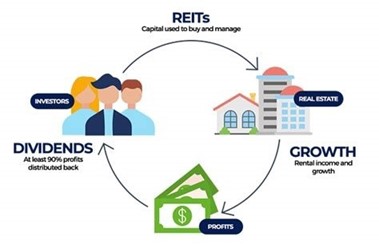Making Money with Real Estate Invesment Trusts
There are REITs (Real Estate Investment Trusts). Someone else maintains the properties, and you simply reap the rewards of the profits of the companies. Not all Reits are alike, and I encourage you to study these closely before making any purchases. Note that MREITs provide funding, but do not own the property. Do not automatically ignore MREITs as there are many good ones. We may come back and do an article on just MREITs due to the complexity of them. The more I read, the more I realize we must study these to clearly analyze their profitability compared to regular REITs.
David Parham
6/5/20245 min read


Investing in Real Estate Investment Trusts (Reits)
DISCLAIMER - I am not a Financial Advisor and do not work for any Brokerage Firm. The opinions given are my own and are not to be used as professional advice. These are my findings and can hopefully help you to make informed decisions on investing. Consult a Broker or Lawyer before making any investment.
One of the most underused investment categories to obtain Passive Income is Real Estate Investment Trusts known by the acronym of Reits or Reit. We discussed a large number of investment categories in an earlier article. That article did not break out all the types of investments a person could make, it simply listed the 4 main types of investments which are Stocks, ETFs (Electronic Traded Funds), Mutual Funds, and Bonds.
One of those 11 diversification types is Real Estate. A person can invest in Real Estate in many ways. You can rent a room of your home, purchase a duplex, live on one side, and rent out the other. You can buy houses individually and use them for rental property, or purchase apartment complexes. Each of these methods gives you passive income, but all require a substantial amount of effort and may require assistance in maintenance or maintaining the tenants and collecting the rent.
Then there are REITs (Real Estate Investment Trusts). Someone else maintains the properties, and you simply reap the rewards of the profits of the companies. Not all Reits are alike, and I encourage you to study these closely before making any purchases. Note that MREITs provide funding, but do not own the property. Do not automatically ignore MREITs as there are many good ones. We may come back and do an article on just MREITs due to the complexity of them. The more I read, the more I realize we must study these to clearly analyze their profitability compared to regular REITs.
One of the great things about REITs is that most of them own the properties. Many Reits return above 10% on annual or quarterly dividends, making them excellent for passive income. And if they own the property, you can expect appreciation in Property values, particularly in this high inflation market we currently are in. I am so pleased with REITs potential, that I am currently upping my investments to have 11 to 15% of my total Roth IRAs invested in some form of REITs due to the high dividends and stock appreciation.
Before explaining all the types, let me also mention that if you do not want to spend the time to research all the stocks (REITs), then there are some excellent ETFs that do the legwork for you and give consistent average returns. I have all 3 of these in my investments and all have done very well. Note there are many others that invest in REITs, these just happen to be the 3 we have purchased.
Check out the following three:
RIET - Hoya Capital Hi Dividend ETF
HOMZ - Hoya Capital Full REIT ETF
VNQ - Vanguard Real Estate Index Fund ETF


MREITS are companies that provided funding for Rental Properties (IE: Mortgage REITs). Mortgage-backed securities ae bundles of mortgages package together to form a bond-like asset.
A good website article on MReits by Michael Webster is:
https://www.moneycrashers.com/mortgage-reit-mreit-definition/
The next few paragraphs were pulled from that article above.
What Is an mREIT?
The “m” stands for “mortgage,” as mREITs are a special group of REITs that base their real estate investments on the mortgage market. For the most part, this means that mREITs buy mortgages on the secondary mortgage market – in other words, they purchase mortgage debts.
After a bank lends money to someone buying a house, the bank sells that mortgage to a mortgage buyer (such as an mREIT), and since mortgage rates are tied to the government bond market, mREITs are closely tied to that market as well.
Types of mREITs:
When an mREIT is established, it usually specializes in one type of mortgage debt. Some companies only buy mortgages that are backed by a federal agency like Fannie Mae, Freddie Mac, or Ginnie Mae. They choose these mortgages because they are backed by a federal guarantee and thus there is a lower risk of default, which means that they are also less profitable.
Other mREITs, sometimes called non-agency mREITs, specialize in mortgages that are not guaranteed by a federal agency. These tend to pay higher dividends, largely because there is a higher risk of the mortgages being defaulted upon.
Owning Shares
Investors can buy into these mREITs by buying shares in the companies, which are publicly traded on a stock exchange. As a partial owner in the company, shareholders receive dividends from the mREITs – and that is where those attractive high yields come in.
Like other public companies, an mREIT goes up and down in value as the market reevaluates the company’s value. If investors believe that an mREIT will become less profitable because it becomes more expensive for them to raise money or because mortgages will underperform, the share price will go down. Since many investors look at mREITs as a source of passive income thanks to those high dividends, mREIT shares will also depreciate if investors think that dividends will go down.
Some of the other types of REITS where most own the properties are:
(These are specifically focused REITs)
Office REITS provides commercial real estate involving office and Rental business space.
Residential REITs focus on single-family homes, residential housing such as apartments, and mobile home lots.
Data Center REITs. Rather than proving physical storage, these may be providing data storage such as Cloud sore in data server facilities. DLR/Digital Reality is one such REIT.
HealthCare REITS. Of course, this category focuses on the healthcare sector including medical offices, Senior-living facilities, and hospitals. A couple of the larger established Healthcare REITS are MPW – Medical Property Trust, and LTC Properties (LTC).
Infrastructure REITs. These build the inner workings of cities and towns including cell towers, energy pipelines, fiber, and telecommunication structures.
Retail REITs. These are mainly shopping centers and malls.
Hospitality REITs. These are focused on hotels and resorts dealing mainly in lodging.
Timberland and Farmland REITs. These are focused on land for farm crops, and farmlands.
Industrial REITs. These mainly deal in large warehouse and distribution centers.
A hot REIT nowadays is the Self Storage REITs. They collect rents from individuals and companies storing items in Self Storage units.
With so many types of REITs, you may want to consider just purchasing the ETFs such as Riet, Homz, or VNQ which give you exposure to what they consider the overall REITs and give consideration to all categories.
I will come back and do a more extensive article on REITS in the future. I clearly think these are excellent investments. There are a lot of good ones and some not-sogood investments in REITs. So be careful and don’t just chase the high dividends. Look at their long-term Earnings Per Share and their Price to Earnings Ratio.
(P/E).
The total asset values should exceed their market share. (Number of outstanding shares * Price Per Share.) This requires pulling the Balance Sheet from their quarterly 10-Q SEC filings which we will delve into in future articles. Always be aware of all the pitfalls in investing and don't just take recommendations, but prove the numbers in a logical decision-making process.
Contact
davidparham@lifecanbesimple.net
Follow
Connect with Us
+1 940-730-5105